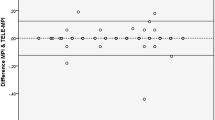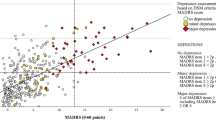Abstract
OBJECTIVE: To develop and validate a Spanish version of the Geriatric Depression Scale (GDS) for telephone administration.
DESIGN, SETTING, AND PATIENTS: The original version of the GDS was translated into Spanish. A random sample of 282 ambulatory elderly individuals was contacted by phone. Those completing the phone GDS (GDS-T) were asked to schedule an appointment within two weeks in which we collected data on demographics, physical exam, functional and mental status, and a face-to-face version of the GDS (GDS-P). We estimated question-to-question κ statistics and the Pearson correlation coefficient between the GDS-T and GDS-P scores. We evaluated reliability of the GDS-T and GDS-P using the Cronbach’s α coefficient. We estimated the sensitivity, specificity, and criterion validity of the GDS using the DSM IV criteria for depression as our gold standard.
RESULTS: Thirty patients (11%) refused to participate. Of the remaining 252 patients, 169 (67%) attended the personal interview. The Cronbach’s α coefficient was 0.85 for GSD-P and 0.88 for GDS-T. Sensitivity and specificity were 88% and 82% for GDS-P and 84% and 79% for GDS-T. The prevalence of depression in the group completing both scales was 12.8% using the GDS-P and 14.9% using the GDS-T (P>.05). Among those who only completed the GDS-T, the prevalence was 22.7% (P<.05) suggesting that depressed patients kept their appointments less frequently.
CONCLUSIONS: The telephone GDS had high internal consistency and was highly correlated with the validated personal administration of the scale, suggesting that it could be a valid instrument for screening of depression among elderly ambulatory Spanish-speaking patients. Because the depression rate was significantly higher among those not presenting to the personal evaluation, the adoption of GDS-T may help detect and plan early interventions in patients who otherwise would not be identified.
Similar content being viewed by others
References
Blocklehurst JC, Tallis RC, Fillit HM. Textbook of Geriatric Medicine and Gerontology. 4th Ed. Edinburgh: 1992; Churchill Livingstone.
Henriksson MM, Martunen MJ, Isometsä ET, et al. Mental disorders in elderly suicide. Int Psychogeriatr. 1995;7:275–86.
Katz IR. On the inseparability of mental and physical health in aged persons: lessons from depression and medical comorbidity. Am J Geriatr Psychiatry. 1996;4:1–16.
Bruce ML, Seeman TE, Merril SS, et al. The impact of depressive symptomatology on physical disability: MacArthur studies of successful aging. Am J Public Health. 1994;84:1796–9.
Lebowitz BD, Pearson JL, Schneider LS, et al. Diagnosis and treatment of depression in late life. Consensus statement update. JAMA. 1997;278:1186–90.
Yesavage JA, Brink TL, Rose TL, et al. Development and validation of a geriatric depression screening scale: a primary report. J Psychiatr Res. 1983;17:37–49.
Burke WJ, Nitcher RL, Roccaforte WH, et al. A prospective evaluation of the Geriatric Depression Scale in an outpatient geriatric assessment center. J Am Geriatric Soc. 1992;40:1227–30.
Kafonek S, Ettinger WH, Roca R, et al. Instruments for screening for depression and dementia in a long-term care facility. J Am Geriatr Soc. 1989;37:29–34.
Parmelee PA, Lawton MP, Katz IR. Psychometric properties of the Geriatric Depression Scale among the institutionalized aged. Psychol Assess: J Consult Clin Psychol. 1989;1:331–8.
Burke WJ, Roccaforte WH, Wengel SP, et al. The reliability and validity of the Geriatric Depression Rating Scale administered by telephone. J Am Geriatr Soc. 1995;43:674–9.
Katz S, Downs TD, Cash HR, et al. Progress in development of the index of ADL. Gerontologist. 1970;10:120–30.
Lawton MP, Brody EM. Assessment of older people: Self-maintaining and instrumental activities of daily living. Gerontologist. 1969;9:179–86.
Folstein MF, Folstein SE, McHugh PR, Mini-Mental State. A practical method for grading the cognitive state of patients for the clinician. J Psychiatr Res. 1975;12:189–98.
Issacs B, Akhtar AJ. The set test of mental function in old people. Age Aging. 1972;1:222–6.
American Psychiatric Association. Diagnostic and Statistical Manual of Mental disorders. 4th Ed. Washington, DC: American Psychiatric Press; 1994.
Eisenberg L. Treating depression and anxiety in primary care. N Engl J Med. 1992;326:1080–4.
Whooley MA, Stone B, Krikor S. Randomized trial of case-finding for depression in elderly primary care patients. J Gen Intern Med. 2000;15:293–300.
US Bureau of the Census. Statistical Abstract of the United States. 116th Ed. Washington, DC: US Government Printing Office; 1996.
US Bureau of the Census. Projection of Population by Sex, Race and Hispanic Origin, Divisions and States: 1993–2020-Series A. Washington, D.C.: U.S. Department of Health and Human Services; 1990.
Author information
Authors and Affiliations
Corresponding author
Additional information
Presented at the 21st Annual Meeting of the Society of General Internal Medicine, Chicago, April 23–25, 1998.
This study was supported by a grant from the Fundación MF para el desarrollo de la Medicina Familiar y la Atención Primaria de la Salud.
Rights and permissions
About this article
Cite this article
Carrete, P., Augustovski, F., Gimpel, N. et al. Validation of a telephone-administered geriatric depression scale in a hispanic elderly population. J GEN INTERN MED 16, 446–450 (2001). https://doi.org/10.1046/j.1525-1497.2001.016007446.x
Issue Date:
DOI: https://doi.org/10.1046/j.1525-1497.2001.016007446.x




